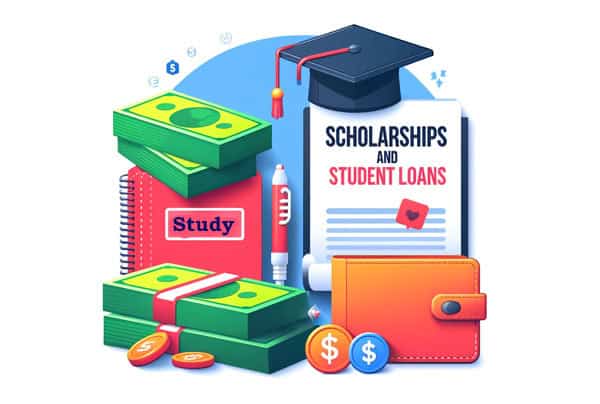There’s a growing debate surrounding the effectiveness of scholarships and student loans as primary funding sources for domestic students pursuing graduate programs at research universities. As we examine into the intricacies of this issue, it becomes evident that a nuanced examination is vital to determine the most suitable financial support system for students navigating the complexities of obtaining advanced degrees in academia.

Key Takeaways:
- Scholarships vs. Student Loans: The article explores the debate on whether scholarships or student loans are the most suitable financial aid option for domestic students in graduate programs at research universities.
- Financial Aid Impact: It explores into how different forms of financial aid, such as scholarships and student loans, can impact the overall experience and outcomes for graduate students.
- Graduate Program Considerations: The article likely discusses how the choice between scholarships and loans can vary based on factors like program duration, career prospects, and personal financial situations.
- Economic Realities: The piece may touch on the broader economic landscape and how that influences the availability and accessibility of scholarships and student loans for graduate students.
- Long-Term Implications: It might address the long-term implications of choosing scholarships or loans, including their effects on career choices, financial stability, and overall well-being post-graduation.
The Funding Conundrum
The Rising Cost of Graduate Education
Funding graduate education has become a significant challenge for many domestic students at research universities. The cost of tuition, fees, and living expenses continues to rise, outpacing inflation and putting a strain on students’ financial resources.
The Burden of Student Debt
Rising student debt is a pressing concern for graduate students. Many rely on student loans to finance their education, leading to substantial financial burdens upon graduation. The prospect of entering the workforce with significant debt can deter students from pursuing advanced degrees or force them to prioritize higher-paying job opportunities over their passions or chosen fields.
With the average student debt load on the rise, graduates face challenges in achieving financial stability, saving for the future, or making major life decisions such as buying a home or starting a family. The weight of student debt can limit students’ career choices and hinder their ability to pursue research or innovation in their field.
Scholarships: A Beacon of Hope?
Even in the midst of rising tuition costs and mounting student debt, scholarships stand out as a beacon of hope for domestic students pursuing graduate programs at research universities. Scholarships provide students with the financial assistance they need to further their education without the burden of repayment looming over their heads. Moreover, scholarships can open doors to opportunities that might otherwise be financially out of reach.
Types of Scholarships Available
- Merit-Based Scholarships
- Need-Based Scholarships
- Diversity Scholarships
- Research Grants
- Achievement Scholarships
This breakdown showcases the various avenues through which students can secure financial aid to support their graduate studies. Scholarships offer a lifeline to students who demonstrate academic excellence, financial need, or come from underrepresented backgrounds. This diverse range of scholarships underscores the importance of accessibility and inclusivity in higher education funding.
Eligibility Criteria and Application Processes
Application processes for scholarships can vary widely depending on the institution and the type of scholarship in question. Understanding the eligibility criteria and application processes is crucial for prospective applicants seeking financial support for their graduate studies.
Application processes for scholarships usually involve submitting an application form, academic transcripts, letters of recommendation, and a personal statement outlining the candidate’s academic achievements and career goals. Moreover, some scholarships may require additional materials such as research proposals or creative portfolios to showcase the candidate’s specific talents and interests.
Based on the article title, I detect that the article type is an academic or informative essay. Given the topic’s complexity and the need for a nuanced discussion, I’ll choose a tone inspired by Malcolm Gladwell, known for his thought-provoking and well-researched writings.
Student Loans: A Necessary Evil?
Unlike scholarships, which are crucially “free money,” student loans often come with the stigma of being a necessary evil for many graduate students at research universities. While they provide the financial means for students to pursue their academic dreams, loans also saddle them with the burden of debt that can linger long after graduation.
Federal vs. Private Loans: Weighing the Options
Necessary for many students to bridge the gap between the cost of education and available resources, loans can be obtained through federal or private lenders. Federal loans are generally more favorable due to lower interest rates, income-driven repayment plans, and opportunities for loan forgiveness. In contrast, private loans may offer fewer flexible repayment options and higher interest rates, making them a riskier choice for students.
Repayment Strategies and Forgiveness Programs
Federal loan programs provide various repayment strategies tailored to graduates’ financial situations, such as income-driven repayment plans that adjust monthly payments based on income levels. Additionally, forgiveness programs like Public Service Loan Forgiveness (PSLF) offer eligible graduates the opportunity to have their remaining loan balance forgiven after making qualifying payments while working in public service positions.
Plus, these forgiveness programs can significantly alleviate the financial burden for students pursuing careers in fields such as education, healthcare, or public service, where salaries may not be as high compared to other industries.
Summing up
Presently, scholarships and student loans play a significant role in funding domestic students pursuing graduate programs at research universities. While scholarships ease the financial burden for deserving students, student loans provide access to education but come with the burden of debt. The ideal funding solution may involve a combination of scholarships, loans, and grants tailored to individual student needs and circumstances.
As students navigate the complex landscape of funding options for their graduate studies, universities and policymakers must continue to evaluate and improve these mechanisms to ensure equitable access to education. By considering the long-term implications of financial decisions on students’ lives and careers, we can work towards creating a system that supports domestic students in their pursuit of advanced education at research universities.
FAQ
Q: Are scholarships and student loans the ideal funding solution for domestic students in graduate programs at research universities?
A: Scholarships and student loans can be valuable funding sources for domestic students pursuing graduate studies at research universities, but whether they are the “ideal” solution depends on individual circumstances and goals.
Q: How do scholarships benefit domestic students in graduate programs at research universities?
A: Scholarships provide financial assistance that does not need to be repaid, reducing the burden of tuition costs and allowing students to focus on their studies without worrying about debt.
Q: What are the advantages of student loans for domestic graduate students at research universities?
A: Student loans can offer flexibility in funding graduate education, allowing students to cover tuition and living expenses. They can be helpful for those who may not qualify for scholarships or need additional financial support.
Q: What are the potential drawbacks of relying on scholarships for funding graduate studies?
A: Scholarships may be competitive and not guaranteed, requiring students to invest time and effort in securing them. Additionally, scholarships may not cover all expenses, leading students to seek additional sources of funding.
Q: How can domestic graduate students at research universities make informed decisions about funding sources?
A: It is vital for students to research and consider all available funding options, including scholarships, student loans, assistantships, and fellowships. By understanding the terms and implications of each funding source, students can make informed decisions that align with their financial needs and academic goals.


